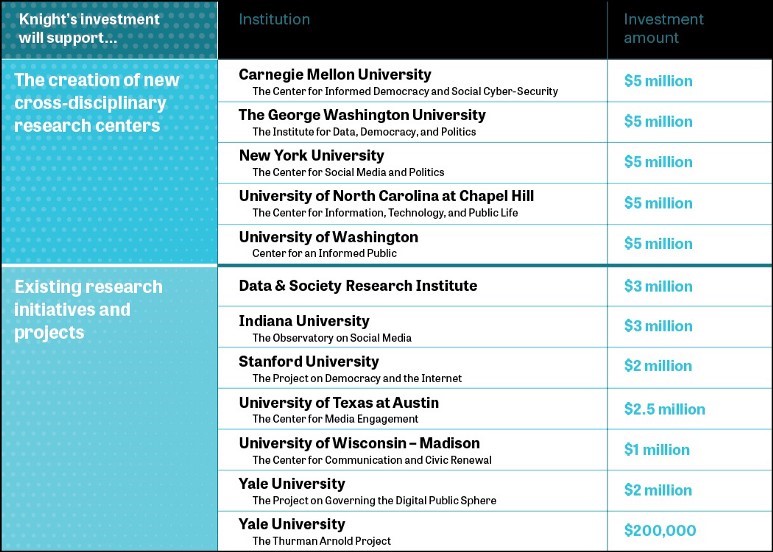You have /5 articles left.
Sign up for a free account or log in.
The spread of misinformation, election interference and the growing prevalence and influence of social media companies have all been hot-button topics since the 2016 election. But how much is technology really shaping people’s lives?
Leaders at the Knight Foundation, a nonprofit organization best known for supporting journalism and the media, think urgent research is needed to help answer this question. The foundation this week announced $50 million in funding for 11 universities and research institutions to support research exploring how social media is influencing democracy.
Half of the funding will be used to create new cross-disciplinary research centers at Carnegie Mellon University, George Washington University, New York University, the University of North Carolina at Chapel Hill and the University of Washington. Each will receive $5 million.
The foundation is also awarding $13.7 million to support existing initiatives at the Data and Society Research Institute, Indiana University, Stanford University, the University of Texas at Austin, the University of Wisconsin Madison and Yale University. The remaining $11.3 million will be used to create a new funding opportunity for policy and legal research into how tech companies such as Facebook should be governed.

Sam Gill, vice president for communities and impact at the Knight Foundation, said the $50 million fund is part of a larger commitment to strengthen journalism and democracy. The foundation committed $300 million last February to researching the impact of technology on society and democracy. It also pledged to support local news and “rebuild trust in democracy from a local level up.”
The Knight Foundation received over 100 responses to a call for proposals from institutions eager to create or grow their own research centers and selected 11 institutions where there was already “energy and coherence around this work” but “it just needed a nudge,” Gill said.
Foundation administrators hope the investment will draw attention and give legitimacy to a new field of research -- one where there is already high-quality work happening but that has not yet gained prominence, he said.
“We want the insight and ideas from this research to inform urgent debates,” said Gill. “What should our relationship to technology be? Are social media companies too big? These are questions of the highest stakes.”
Gary Marchionini, dean of the school of information and library science at the University of North Carolina at Chapel Hill, will be the principal investigator at the newly created Center for Information, Technology and Public Life.
The center will give academics a multidisciplinary space to brainstorm and hold discussions -- uniting researchers with expertise in computer science, media, law and politics, said Marchionini.
There are no commitments to offer new classes to students through the center, but such offerings could be made in the future, he said.
The funding will enable UNC to hire one new tenure-track faculty member and at least three postdoctoral researchers at the center, he said. Two other funders, the Hewlett Foundation and Luminate, have already pledged additional financial support.
The Knight Foundation’s $5 million support for the new cross-disciplinary research center at UNC is a one-time gift to be spent by UNC over the next six years. Marchionini doesn’t foresee any problems finding future funding sources and believes the research of the center, and others like it, “is going to attract a lot of attention.”
Marchionini expects that government funding agencies such as the National Science Foundation may follow suit and turn their attention to this kind of research. Tech companies, too, will likely continue to fund research efforts, but accepting this money raises ethical questions for researchers, he said.
Zeynep Tufekci, associate professor of information and library science at UNC, said she is excited to finally have “a genuine place for interdisciplinary work” on campus.
The Knight Foundation funding provides an “enormous opportunity” not just for UNC but for the field nationally, she said.
“It can’t just be one place or one academic looking at these issues -- we need a societal response,” she said.
Tufekci believes research on the impact of technology on society has been “terribly underfunded,” especially when the profitability of technology companies is considered.
“It’s an urgent area of public interest,” she said. “If we look back at how much the world has changed in the past few years, we haven’t scaled the research accordingly. I think the Knight Foundation deserves a lot of credit. This was going out on a limb for them -- they don’t usually fund basic research.”
While Tufekci noted the importance of researchers remaining independent from technology companies, she acknowledged that researchers also need the companies' collaboration to access data and information. Accessing data from social media platforms is better than it used to be, as political pressure has forced some transparency, but it is still a problem, she said.
The new Institute for Data, Democracy and Politics at George Washington University would not have been created without Knight Foundation funding, said Steven Livingston, professor of media and public affairs. Like UNC, GW hopes to hire several new postdocs and establish a new discipline with a distinct purpose.
“This institute has been the result of hundreds of hours of refinement,” said Livingston.
Although the Knight Foundation’s funding was spurred in part by reports of Russian interference in the 2016 U.S. election, the research at GW and elsewhere will be broad in scope. Livingston’s recent research has focused on disinformation campaigns surrounding important global news, such as Malaysia Airlines Flight 17, which was gunned down over Ukraine in 2014, and the use of chemical weapons in Syria.
“We believe that the 2016 election has already been so thoroughly researched that it doesn’t make sense for us to do it,” he said. “We’re turning our attention to the 2020 election. But the work is not just about elections.”








